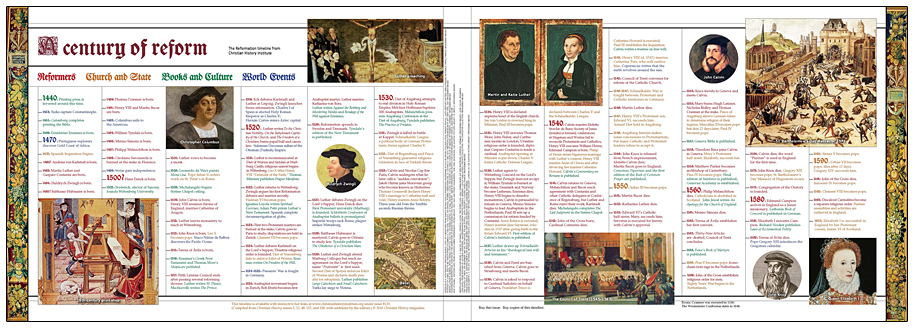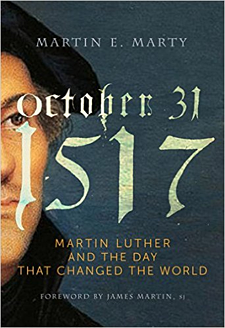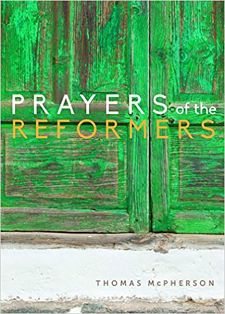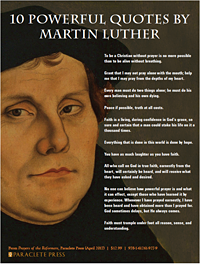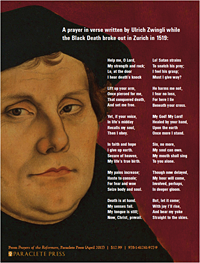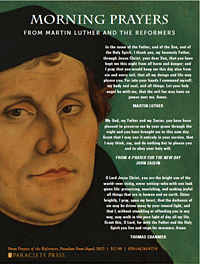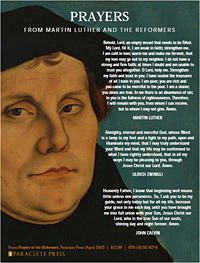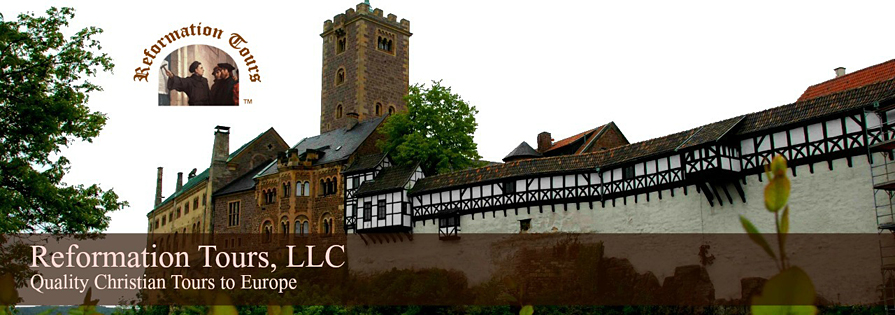Reformation Resources
To Accompany Tim Botts 2017 Reformation Calendar
SHARING OUR STORY OF FAITH ACROSS THE AGES
CALENDAR | TIMELINES | STUDY GUIDES | DVD’S | EXHIBITS | FINE ART PRINTS
REFORMATION TIMELINES
CHRISTIAN HISTORY MAGAZINE
Big Downloadable Reformation Timeline PDF
The sweep of the Reformation and counter-Reformation is visualized in a big, colorful, downloadable timeline with links to related stories. The back of the timeline has a summary of the main lines of the Reformation.
Individual Timelines - click on links below
The Life and Times of Martin Luther: A Global Perspective
Pictorial timeline of Reformation History
PARACLETE PRESS
BOOKS
The Day That Changed the World
by Thomas McPherson
PARACLETE PRESS
PDF's
by Martin Luther
by Ulrich Zwingli
Martin Luther & the Reformers
Martin Luther & the Reformers
CHRISTIAN HISTORY MAGAZINE
REFORMATION ISSUES FREE - PDF Downloads
CHRISTIAN HISTORY INSTITUTE
STUDY GUIDES FREE - PDF Downloads
The Reformation modules pick up in 1300 and run through the early part of the 1600s. This segment covers topics such as John Wycliffe, Luther’s Catechism, John Foxe, and the St. Bartholomew’s Day Massacre.
Thirteen modules, consisting of excerpts from documents in church history, were chosen and introduced by church historian Stephen Tomkins. They are intended for self study or as a quarterly introduction to church history for a weekly Sunday school class or other study group.
The Post-Reformation modules pick up in 1580 and run through the early 1800s. This section covers topics such as Menno Simons, the King James Bible, John and Charles Wesley, and William Carey.
These thirteen modules, consisting of excerpts from documents in church history, were chosen and introduced by Dan Graves. They are intended for self study or as a quarterly introduction to church history for a weekly Sunday school class or other study group.
ART EXHIBITS
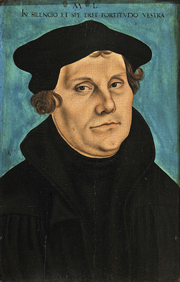
The Morgan Library & Museum in New York City is hosting an exquisite exhibition entitled “Word and Image: Martin Luther’s Reformation.” The exhibition is dedicated to the events in Martin Luther’s life that proved to be significant for the development of the Reformation. Visitors follow Luther from his nailing his theses to the church door in Wittenberg to the Diet of Worms to his time at Wartburg Castle, where he translated the Bible.
The exhibition examines the Reformation as a media event, shedding light on the various stages of the Reformation and their marketing by Luther’s contemporaries in books, drawings and even in music. Many precious objects from museums in Central Germany bring the reformer’s work to life, including important treatises and autograph manuscripts. Over 100 selected works of art, drawings and paintings provide a visual representation of the main arguments.
See the Exhibit (Make sure to click “Next” to see all the art in the Exhibit)
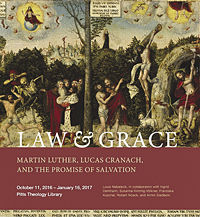
In the Pitts Theology Library at Emory University’s Candler School of Theology in Atlanta, is an exhibition entitled “Law and Grace: Martin Luther, Lucas Cranach and the Promise of Salvation.” The exhibition centres on the reformatory motif of salvation featured in the painting “Law and Grace” by Lucas Cranach the Elder. Several printed works and selected exhibits from the four cooperating German museums show the main thrust of Luther’s reform: the concept of man’s salvation by God’s grace alone.
The center piece of the exhibit is the painting “Law and Grace” by Lucas Cranach, showing the contrasting Lutheran concepts of law and the Gospel, i.e. the Old and the New Testament. The two-part painting illustrates how man is lost under the law via biblical motifs from the Old Testament. This is contrasted on the right-hand side of the painting by God’s grace, which can only be obtained through faith.
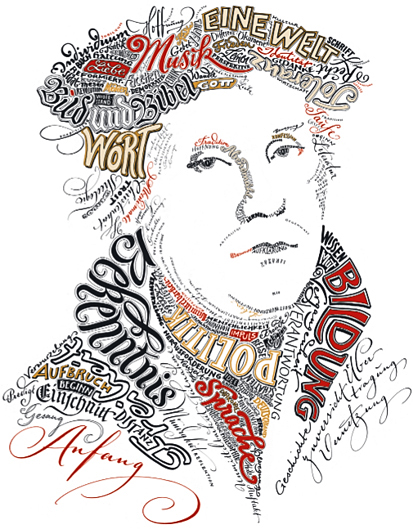
The 500th anniversary of Luther’s 95 theses is being celebrated at institutions across the country, showing how deftly he used the media of his day.
CHRISTIAN HISTORY INSTITUTE
180 DVD's
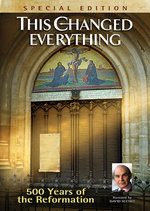
Celebrating the fruits of the Reformation while exploring difficult questions about the cost of division: Could schism have been avoided? Is there hope for reunification? What did Jesus really mean when He prayed for His followers to be “one”?
In this visually rich, three-part documentary series hosted by actor David Suchet, leading church historians share fascinating insights and pose vital questions about unity, truth, and the future of the Christian church.
Among the experts featured in this series are Dr. Frank James, Dr. John Armstrong, Dr. Michael Horton, Dr. Jacqueline Rose, Bishop Robert Barron, Mark Galli, Dr. Joel Harrington, Shane Claiborne, Dr. Karin Maag, Dr. Frans VanLiere, Dr. Scott Kisker, and many others.
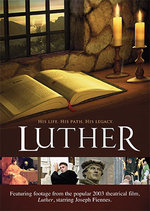
Using stunning dramatic footage from the 2003 theatrical film “Luther”, starring Joseph Fiennes, this documentary gives a comprehensive overview of the great reformer’s life and legacy.
Very few historical figures have affected modern society and humanity as enduringly as Martin Luther, and on such a global scale. This comprehensive documentary traces the footsteps of the great Reformer and reflects upon the places that have become inseparably connected with his name. The program features stunning dramatic footage from the 2003 theatrical film, “Luther” along with interviews with experts discussing his life and work. Also includes an interview with Joseph Fiennes and others involved in the “Luther” production.
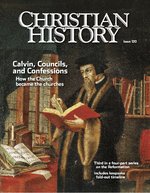
It’s the middle of the sixteenth century, and earth-shattering ideas of reform have spread across all of Europe while hope for reunion with the Roman Catholic Church has faded. As “Lutherans” flounder in their search for new leadership, followers of Zwingli thrive in the cities; believers in England bounce between Catholic and Protestant monarchs, and Anabaptists find their voice through a guy known simply as “Menno.” Onto this stage steps John Calvin, the hopeful priest turned reluctant lawyer whose fateful stopover in the city of Geneva transformed him into an incredibly influential reformer. Read his story along with the story of the divisions, martyrdoms, victories, and disappointments of the last half of the 16th century in the this issue of Christian History, the third in our series of four chronicling the Reformation. Includes keepsake foldout timeline on the Reformation.
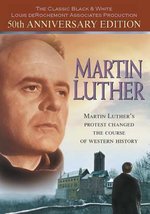
The dramatic black and white classic film of Martin Luther’s life made in the 1950’s. This film was originally released in theaters worldwide and nominated for an Academy Award. A magnificent depiction of Luther and the forces at work in the surrounding society that resulted in his historic reforming efforts. This film traces Martin Luther’s life from a guilt-burdened monk to his eventual break with the Roman Church. This film, in spite of its age, continues to be a popular resource to introduce Martin Luther’s life.
SPECIAL 50TH ANNIVERSARY EDITION includes:
Bonus Materials:
- Biography of a Film with Robert E. A. Lee
- Bios and photos of the actors and production personnel
- Full-color tour of Luther sites
- Chapter titles for easy scene access
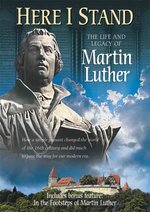
It is claimed that there have been more books written about Martin Luther than anyone else other than Jesus Christ. In those lists pundits compile about who were the most influential in shaping our modern world, the name Martin Luther inevitably shows up near the top, usually in the top ten. He is one of those few who can be proclaimed indisputably a “hinge of history.”
Yet Luther never wanted to be a renowned world shaper. He was more concerned to save his own soul and entered a monastery to get away from the world and seek his own salvation. But in finding his salvation, he rediscovered foundations of Biblical Christianity that shook the late Medieval world and challenged its assumptions about religious authority, what God was like, how we are to approach him, and how God saves us.
T.N. Mohan, producer and director of the award-winning documentary on the life of Dietrich Bonhoeffer, Hanged on a Twisted Cross, returns to Germany to tell the story of its most famous son, interpreted from an overtly Protestant perspective. In this two-hour special, we come to understand Luther, what motivated him, the turning points in his life, the issues he confronted, the opposition that sought to defeat him, and the profound changes brought about under his leadership and ministry.
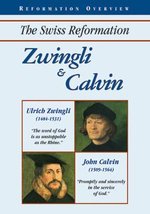
This program covers the 16th century Swiss Reformation, its key centers of Zurich and Geneva, and its central leaders, Zwingli and Calvin—two theologians who led tumultuous lives. Zwingli questioned major teachings of the church and instituted sweeping reforms. He sought to apply the Word of God for the transformation of civic and church life. Calvin laid the foundation that made Geneva a unique international center. He wanted only the quiet life of a scholar but was thrust into a critical role in Reformation and theological leadership.
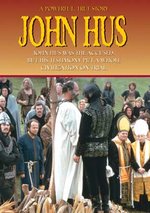
Here is an important chapter in the steps leading up to the Reformation. The history books make little mention of this Bohemian priest and scholar who lived 100 years before Martin Luther and the Protestant Reformation. Yet, John Hus was convinced and taught openly that the Bible should be presented in the language of the people, that salvation comes by faith in Jesus Christ, and the Word of God is the final authority. He taught in the University of Prague and as a pastor, challenged the abuses of medieval Christendom.
Intrigue and false promises weave a powerful story of one man’s commitment to faith in Jesus Christ. He was summoned to the Council of Constance and promised safety, but he was betrayed. In the end, Hus was accused, imprisoned, and charged with heresy. Ultimately, he was condemned and burned at the stake as a heretic.
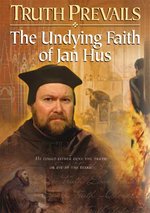
Almost 600 years ago, a humble peasant stood alone against pope, emperor and king. He could either deny the truth he believed with all his heart, or he could die at the stake. Today Jan Hus is little known outside of his native Czech Republic, but in his day he challenged corrupt church officials and inspired thousands to live for truth. In an age when Europe was divided between three popes, when pestilence claimed one in three lives and church offices were available to the highest bidder, Hus defied the earthly authorities to seek truth directly from the Word of God.Truth Prevails, a quote from Hus himself, is an hour-long documentary from The Christian History Institute and award-winning filmmakers Jerry and Misha Griffith. Using location footage, interviews with prominent historians and period artwork, this film follow the struggles of Jan Hus and the efforts of modern scholars which ultimately led Pope John Paul II to apologize for the Church’s actions. Truth Prevails is more than just a look at an amazing life in a turbulent time. It is also a thought-provoking examination of many difficult issues facing anyone living in any time: When should we stand our ground and when should we back down? Which issues are worth dying for? How should we speak out against what we know is wrong? And ultimately, when should we ask for and offer forgiveness?
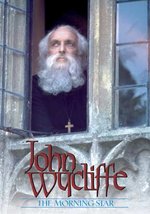
“John Wycliffe” is a dramatic biography of the life of the 14th century scholar and cleric who translated the Bible into English for the first time.
Wycliffe found himself in the middle of religious, political and social conflicts. An Oxford scholar, one of Europe’s most renowned philosophers, John Wycliffe was a defender of English nationalism against the power of the pope and a champion of the poor against the injustices of the rich. John Wycliffe taught that God’s forgiveness cannot be bought with indulgences. John Wycliffe preached that the only true authority is the Word of God, and the Word could only be understood by all if the people could read it in their native tongue. “John Wycliffe” captures the trials and heroic struggles of this significant man of faith - the “Morning Star” of the Reformation.

Based on the Gateway Films/Vision Video church history film series, these six half-hour programs vividly bring to life the Reformation, its colorful leaders, and history-shaping turning points.
1. John Wycliffe - Called the “Morningstar,” this courageous forerunner paved the way for momentous changes to come. His teachings challenged the authorities, but they exiled him, and his exile provided the opportunity for his monumental achievement that has benefitted us all -- the Bible in English.
2. John Hus - He carried forth Wycliffe’s groundbreaking work. His passionate calls for reform brought him before the Council of Constance. There he was betrayed by false accusations. He refused to capitulate and was condemned to burn at the stake. He died singing.
3. Martin Luther - He wanted only the quiet solitude of the monastery. There this guilt-burdened monk discovered the freedom of the Gospel. He couldn’t keep quiet about it, nor could he stop the relentless swirl of events that propelled him to a decisive role in the shaping of the modern world.
4. Ulrich Zwingli and John Calvin - They led the Reformation in Switzerland. Both capable scholars, they had to interpret the newly recovered dimensions of the Gospel in the midst of a hurricane of change, social chaos and fierce opposition. From Zurich and Geneva their writings and developments would permeate the church worldwide.
5. The Anabaptists - Called “the Radicals,” they were opposed by just about everyone--Catholics, Protestants, and political leaders. Two of their earliest leaders, Michael and Margaretha Sattler, were executed for their beliefs while still young, but their legacy endures to this day.
6. God’s Outlaw: William Tyndale - This humble, young scholar became one of the most hunted fugitives ever, pursued by King Henry VIII, Cardinal Wolsey, Sir Thomas More and others. His crime? Translating and circulating the Bible in English. He was caught and killed, but his unquenchable vision was marvelously fulfilled.
REFORMATION TOURS
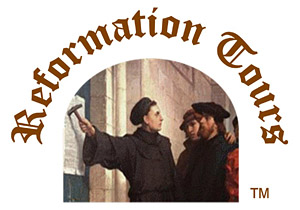
Reformation Tours specializes in quality Christian and cultural tours of Europe and the Bible Lands. You may like to join one of Reformation Anniversary Tours to celebrate the 500th year anniversary of the Protestant Reformation. We also have tours with a focus on John Calvin, John Knox, John Wesley, C.S. Lewis, Jan Hus and many more.
Experience travel from a Christian perspective, with opportunities to fellowship, have fun, and be encouraged in your faith. One of our favorite passages is Psalm 145:4-5 “One generation commends your works to another; they tell of your mighty acts. They speak of the glorious splendor of your majesty — and I will meditate on your wonderful works.”
REFORMATION CALLIGRAPHY & ORIGINAL ART
A Special Feature
Timothy R. Botts Calligraphy
From the Tim Botts 2017 Reformation Calendar
Calligraphy of Martin Luther quotes & Reformational Scripture
CLICK THUMBNAILS TO SEE IMAGES




